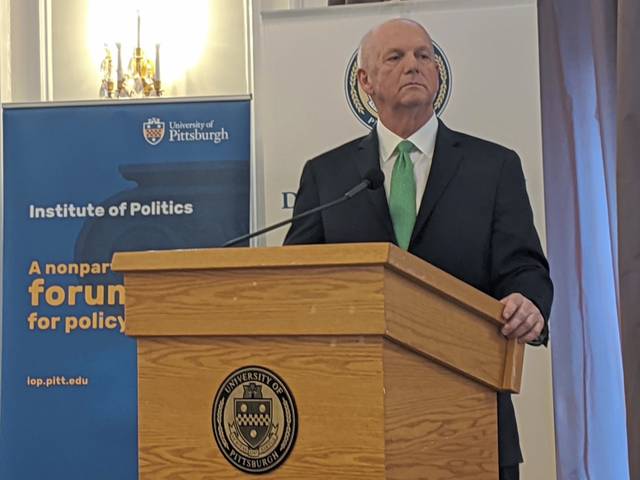Threats to elections in the United States and democracy as we know it are a given in the age of the internet, said David Hickton, founding director of the University of Pittsburgh Institute for Cyber Law, Policy and Security.
The good news: There’s something we can do about it, he said.
“The digital landscape seems like it’s a technology challenge, and therefore it seems overwhelming and daunting to most people,” said Hickton, who served as U.S. attorney for the Western District of Pennsylvania from 2010 to 2016.
His office investigated the computer hacks by Russian military intelligence officers of Democratic Party officials during the 2016 presidential campaign. The case was among the indictments by special counsel Robert Mueller.
“But it is really a human behavior challenge masquerading as a technology challenge,” Hickton said. “Because the best thing we can do is change our human behavior.”
Hickton gave a lecture at the University of Pittsburgh’s Oakland campus Tuesday titled “Can Democracy Survive the Internet?” as part of Pitt’s Dick Thornburgh Forum for Law and Public Policy, outlining two major challenges looming over the 2020 primary and general elections.
The first is keeping elections secure by preventing hacking of election results.
Pennsylvania is a purple state — along with Michigan, Ohio, Florida and Wisconsin, which were all targets for election interference from Russia in 2016 — which puts it at risk for election interference in 2020, Hickton said.
He’s confident that this time around, Pennsylvania’s elections will be among the most secure in the country.
That includes here in Allegheny County, where voters will use a new hand-marked paper ballot system for the first time during the April 28 primary.
“I think they’ve made an improvement,” Hickton said. “We have to train people, we have to make sure there are sufficient people on the ground who can deal with glitches. We really need to get our elections right.”
Allegheny County selected the new voting system in September.
Gov. Tom Wolf called for all Pennsylvania counties to replace voting machines in 2018 after federal authorities uncovered Russian hacking in the 2016 election.
The independent, bipartisan Blue Ribbon Commission on Pennsylvania’s Election Security was co-chaired by Hickton and Grove City College President Paul McNulty, a former U.S. attorney and deputy U.S. attorney general during the George W. Bush administration. The commission concluded in 2019 that Pennsylvania’s voting systems were vulnerable to the same election interference seen in 2016.
“Those efforts included an aggressive misinformation campaign, largely on social media; hacks of sensitive campaign emails; and probing and accessing of state voter registration databases and election vendors,” Hickton said during his lecture. “And just this past week, there are reports that the Russian government is once again meddling in our presidential election and trying to sow discord among Americans. Even if they don’t manipulate the counting of a single vote, these efforts can succeed if Americans lose faith in the results.”
That’s why Hickton is also encouraging voters to be wary of the other major challenge this election year: disinformation that will be spread online, especially on social media.
“You don’t just take things at face any more than you would in an interpersonal conversation, or something that you would read that’s not online,” Hickton said, adding that news consumers should take the time to fact-check what they read and compare coverage across programs or outlets.
“I can’t really help someone who is reading news with the idea that it supports their previous point of view,” Hickton said. “That’s not really news, that’s propaganda. There are many people it appears who are looking to go to news to reinforce what their preexisting belief is.”
He also encouraged internet and social media users to keep their personal accounts secure by changing passwords regularly and using features like two-factor authentication.
As elections draw closer, it’s likely new challenges to election security and combating disinformation will emerge, Hickton said.
“I can’t really describe it, because the speed with which technology is changing is outstripping our ability to make new laws and policies, and that’s one of our challenges,” he said. “So the only thing that’s a given is that technology is going to change, and we’re going to have new threats. Cyber criminals are nimble, and they’re going to adapt to whatever response we have.”








